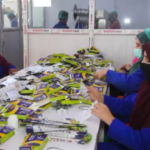The Ministry of Agriculture, Irrigation, and Livestock (MAIL) says this year it purchases more wheat than needed from the farmers of 13 provinces and stores it in silos so that it can be used in times of emergency and to control the price in the markets.
“The Islamic Emirate buys extra wheat from farmers and stores it in silos to redistribute it in emergency situations and to control prices,” said Misbahuddin Mustaeen, a spokesperson for the ministry.
The private sector, meanwhile, considers this process effective to save farmers from the financial crisis and prevent the smuggling of goods from the country.
The members of the private sector stated that the expansion of this program in the whole country affects the improvement of Afghanistan’s economy.
“The performance of the Islamic Emirate in the past three years in the economic sectors, mining, supporting the Afghan industry in monetary stability and infrastructural projects is satisfactory,” said Sakhi Ahmad Payman, the first deputy of the Chamber of Industries and Mines.
Experts in the economic field, however, believe that this move provides the basis for the expansion of the country’s agriculture sector.
Kunduz, Takhar, Samangan, Herat, Badakhshan, Helmand, Kandahar, Farah, Balkh, Sarpul, Faryab, Nimroz and Badghis are among the provinces where wheat will be purchased.
The agriculture officials added they have plan to to expand the process of purchasing wheat from farmers and storing it in strategic reserves in the next year throughout the country.













